It is very common to have acne on areas such as your face, neck, and back during puberty.
This is often known as teenage acne
For those of you who have acne during puberty or have children who do, it can be quite stressful. You may have wondered:
“How long wil it last?”
“What can I do to solve my acne?”
Long story short, it is important to know that the cause of teenage acne and adult acne are different, and that skincare methods are also different for each type.
If you don’t properly understand the causes or use the wrong skincare method, the acne can worsen and continue into adulthood.
In this article, we will be introducing the different characteristics and types of teenage acne, as well as how to properly take care of your skin.
What is teenage acne (acne during puberty)?
Teenage acne is acne that is seen most commonly among people in their 10s.
Depending on the person, the timing and frequency that teenage acne occurs changes.
For some people, it can last longer than others too.
In addition, if you continue to conduct the wrong skincare, it can prolong your acne and leave acne scars.
In order to prevent your skin condition from worsening and to calm it down as much as possible, it is important to take appropriate care for teenage acne.
Causes of teenage acne
Teenage acne occurs during ages 13 to 18 when secondary sex characteristics occur, which is when sebum is excessively produced.
During puberty, hormone production increases rapidly and sebum secretion becomes more active.
It causes your nose, forehead, and other areas to become shiny and sticky.
When sebum production increases and your body’s indigenous bacteria breaks it down, free fatty acids are produced.
This causes abnormal keratinization, which is the process where the skin around your pores thickens.
Abnormal keratinization causes the pores’ entryway to become narrow, causing sweat and dirt to be blocked inside.
It also causes sebum to be clogged inside your pores, since sebum production is excessive during puberty.
This leads to acne bacteria, which feed on sebum, to multiply within your pores.
Your pores then become inflamed, resulting in teenage acne.
Types of acne and their characteristics
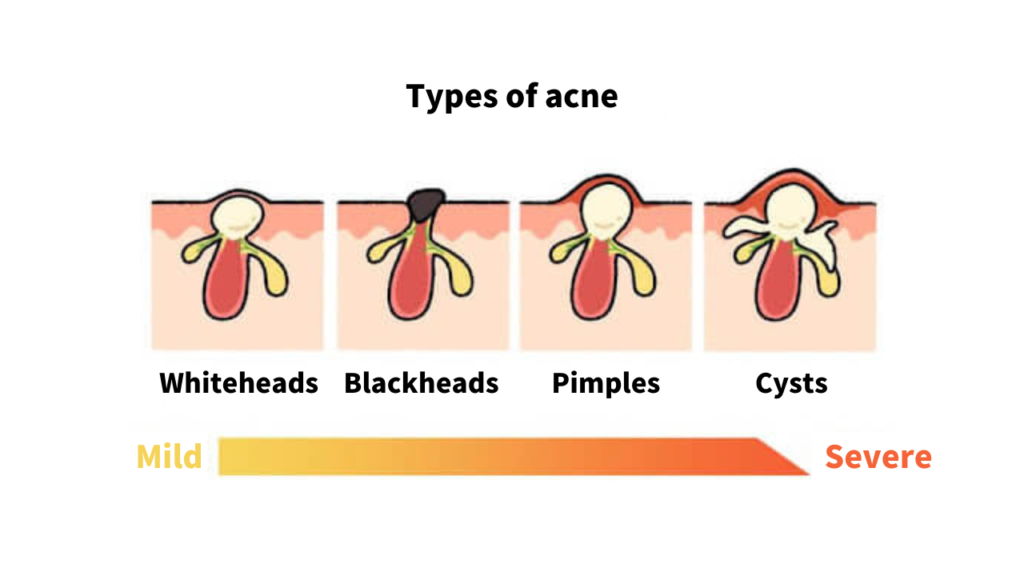
There are 4 types of acne, according to symptoms.
Whiteheads: Clogged pores with a white top
Whiteheads are the early stages of acne, where sebum clogs the pores and acne bacteria begin to multiple.
There is a small white dot in the center.
Whiteheads are not inflamed, are not protruding, and not noticeable.
Blackheads: Clogged pores with a black top
Blackheads appear when the sebum clogged inside the pores are oxidized and turn black.
The pores that were closed with whiteheads begin to open to reveal the black, oxidized sebum inside.
Similar to whiteheads, there is no inflammation, but they are more noticeable.
Pimples: Pus-filled bumps
When whiteheads and blackheads are left unattended, pimples develop.
Inflammation worsens and the skin turns red, as white blood cells try to fight the acne bacteria that have multiplied inside the pores.
In severe cases, pimples can be painful.
Cysts: Painful fluid-filled bumps under your skin
When pimples worsen, it becomes a yellow, fluid-filled pimple.
The inside of the pimple festers and inflammation worsens.
In severe cases, the pore walls break down, causing sebum, pus, and oher substances to overflow out of the pore.
At this stage, i takes time to heal and may leave some scars on the skin.
Areas where teenage acne develops

Teenage acne tends to occur in areas where there are many sebaceous glands.
- Forehead
- Nose
- Temples
- Cheeks
Acne can develop all over your face, or it can develop specifically in the T-zone area.
Typically, teenage acne begins to appear during upper elementary school through junior high school and worsens toward high school, but they heal spontaneously during your 20s.
However, if you continue to use the wrong skincare methods, it can prolong your acne and leave acne scars.
Difference between teenage acne and adult acne
Simply put, teenage acne is acne that develops in your 10s, while adult acne is acne that develops when you are an adult.
Difference in causes
Teenage acne and adult acne both occur when pores are clogged by sebum, but their primary causes are different.
Teenage acne occurs during ages 13 to 18 when secondary sex characteristics occur, which is when sebum is excessively produced.
Acne bacteria mltiplies inside the clogged pores, causing it to become red and inflamed.
In your 20s, your hormone balance begins to stabilize and teenage acne naturally ceases to appear.
However, for some people, it may not disappear as easily.
On the other hand, adult acne is caused by disruptions in your lifestyle, such as:
- Unbalanced diet
- Lack of sleep
- Drinking alcohol
- Smoking
- Stress
- Hormonal imbalance
- Dry air
These factors disrupt the skin’s turnover cycle and dead skin cells clog pores.
Adult acne is heavily influenced by our lifestyle habits, so they do not go away quickly if they are not taken care of with the correct methods.
Difference in areas they appear
Teenage acne and adult acne are also different in terms of where they appear.
Teenage acne tends to occur in areas where there are many sebaceous glands, such as the T-zone.
The T-zone has larger pores and produces 7 times more sebum than other areas, so it should be especially taken care of.
On the other hand, adult acne tends to occur in areas that have low sebum secretion, such as the U-zone and mouth area.
Sebum secretion is not the only cause of adult acne, so it can occur for people who have dry skin too.
Adult acne can also appear on the neck, collar bones, and other areas besides the face.
The areas where acne appears varies from person to person, so your experience may not be exactly the way we explained it above.
However, by knowing the areas where acne appears frequently, you can take care of your skin more efficiently.
Acne problems by age
The age at which teenage acne occurs varies from elementary to high school.
Skin conditions, physical growth, and lifestyle habits change with age, so the nature of skin problems can also change.
Appropriate skincare methods also change depending on these conditions.
Below, we will explain the concerns and cautions of acne by age.
Elementary school students
For early bloomers, teenage acne can develop as early as in the upper elementary school.
The upper grades of elementary school is when a child’s body begins to change into an adult.
Hormone secretion is rapidly activated, which increases sebum production and makes acne more likely to appear.
According to a survey by Kao, 15% of 5th grade boys and 40% of 5th grade girls struggle with acne.
Many elementary school students are also concerned about how they are seen by their peers when they have teenage acne, with 39% of boy snad 78% of girls concerned about their appearance.
Many elementary school students feel embarrassed by their appearance and acne, but they often do not know how to deal with it.
Therefore, it is also important for parents to support and follow up with their children.
Junior high school students
Similar to elementary school students, junior high school students are prone to acne due to changes in their hormonal balance.
In many cases, even those who have never had acne before can develop acne in junior high school.
According to the same survey by Kao, 56.7% of junior high school students struggle with acne.
Because junior high school can be sensitive time, people may be more aware of their appearance and how the opposite sex sees them.
Sometimes, acne or skin problems may cause them to become introverted or insecure.
Since junior high school students are in a period of physical growth, the effects of hormonal imabalnces cannot be avoided.
Even if they adjusted their lifestyle, they may not be able to improve their skin condition.
If teenage acne is worsening, consider consulting a dermatologist.
High school students
In high school, people become even more concerned about their appearance and the eyes of those around them.
It is also the time when acne problems increase.
Many high school students suffer from mental illnesses because they compare themselves with others around them.
In some cases, acne can cause stress because their scope of activities expands (e.g. part-time jobs, dating, etc.).
Stress from studying for exams can also worsen skin problems.
Similar to elementary school and junior high school studens, many high school students consult their parents when they suffer from acne.
On the other hand, there are also many who research on the Internet and try to take care of it on their own.
But if they take care of their acne incorrectly, there is a possibility that it will worsen and leave scars on the skin.
To prevent this from happening, it is important to know the proper acne skincare methods.
Proper skincare methods for teenage acne
As mentioned earlier, teenage acne has different causes and susceptible areas than adult acne.
Therefore, even if you take care of it the same way as adul acne, it will not improve quickly.
Nonetheless, you can still prevent and improve your acne by taking basic skincare steps.
Below, we will introduce 3 skincare methods suitable for teenage acne to help you take proper care of your skin.
【Face washing】Remove excess sebum and dead skin cells
The purpose of face washing is to remove excess sebum and dead skin cells, as well as to maintain the skin’s moisture.
Correct face washing can result in preventing and improving acne.
There are 4 key points to consider when face washing.
1. Wash your face only 2 times a day - once in the morning and once at night.
2. Use cleansers that are non-comedogenic tested or are for acne-prone skin.
3. Lather up your cleanser and gently apply it on your skin.
4. Wash your face with lukewarm water.
The worst thing to do when washing your face is to wash your face repeatedly or scrub it with strong force.
Some people wash their face several times a day to remove oil from their face, but this is counterproductive.
Overwashing your face can cause further sebum secretion and worsen the symptoms of acne.
What is non-comedogenic testing?
Skincare products that have been non-comedogenic tested have been confirmed to not cause acne.
However, just because a product has been non-comedogenic tested, does not mean that it will never cause acne or solve acne completely.
Nonetheless, they can still be used as basis for choosing skincare products because non-comedogenic products do not contain ingredients that can cause acne and oily skin.
How to wash your face
When washing your face, it is important to wash it gently.
Lather up the cleanser and roll it around the skin, rather than rubbing or scrubbing.
After washing, rinse gently with warm or slightly lukewarm water.
Make sure to wash the foam on your hairline and chin, as there tends to be unwashed residue on these areas.
Finally, dry your face with a clean towel by pressing the water off.
【Moisturizing】Replenish water AND oil
Given that teenage acne is caused by excessive sebum production, many people tend to believe that their skin is already moisturized.
Many people may believe that moisturizing will only make their skin stickier, but this is not true.
Proper moisturization can prevent your skin from producing excess sebum.
What is proper moisturization?
・Hydrate the skin by replenishing water
・Prevent hydration from evaporating out of the skin by replenishing oil
Especially after washing your face, it is crucial to apply oil to prevent your skin’s hydration from evaporating.
When your skin is dry, it produces excess sebum, which worsens acne.
It is important to replenish water and oil to our skin to prevent dry skin and excess sebum production.
【UV protection】Apply sunscreen after skincare
You may think that applying sunscreen will make your skin more prone to acne.
True, some products may cause pimples and acne.
However, it is important to take proper UV protection measures because UV rays cause negative consequences on the skin, such as acne, sunburn, and blemishes.
There are 3 reasons why UV rays can worsen acne.
3 reasons why UV rays worsen acne
1. UV rays disrupt the skin's turnover cycle, causing pores to be more easily clogged.
2. UV rays increase sebum production and oxidize sebum.
3. UV rays act on acne bacteria to generate reactiv oxygen species.
To protect your skin from such damage, it is important to apply sunscreen regardless of the season and weather.
How to choose sunscreen
For people struggling with acne, it is best to choose a sunscreen that is low-stimulus.
Specifically, there are 5 points to look out for when choosing a sunscreen.
5 guidelines for choosing sunscreen
1. SPF 20~30
2. Non-comedogenic tested
3. Contains 100% UV scattering agents
4. Waterproof
5. Cream-type or milk-type
Typically, it is assumed that sunscreens with higher SPF values have greater UV protection effects.
In reality, sunscreens with SPF values over 30 all have the same effect.
Not to mention, a higher SPF value causes greater harm to the skin.
Therefore, a sunscreen with SPF 20~30 has the best balance: not too damaging on the skin, but still great at protecting the skin from UV rays.
Another key point is that the sunscreen contains 100% UV scattering agents.
Sunscreens are either made up of UV absorbing agents or UV scattering agents, but UV absorbing agents cause harmful chemical reactions on the skin.
If you are struggling with acne and are worried about the irritation sunscreens may cause, it is best to choose non-chemical sunscreens, or sunscreens that do not contain UV absorbing agents.
Skincare products for teenage acne
Below, we introduce and recommend our favorite skincare products for teenage acne.
Facial cleanser that does not remove too much sebum
To recap, there are 4 points to keep in mind when face washing:
1. Wash your face only 2 times a day – once in the morning and once at night.
2. Use cleansers that are non-comedogenic tested or are for acne-prone skin.
3. Lather up your cleanser and gently apply it on your skin.
4. Wash your face with lukewarm water.
It is best to avoid scrubs and exfoliators that forcefully remove sebum, as well as cleansers with high cleansing power, to prevent unnecessary damage to your skin.
Double Cleansing Gel
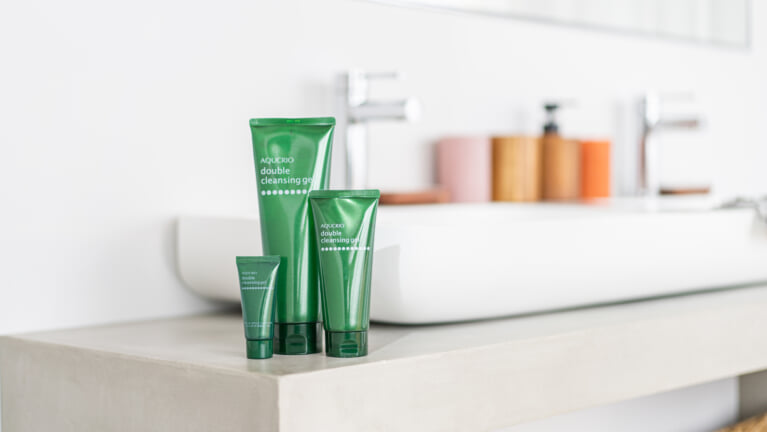
We’d like to introduce Double Cleansing Gel.
Double Cleansing Gel is a cleanser that is perfect for teenage acne because:
- It is a mild cleanser that does not remove too much sebum.
- It has passed the non-comedogenic test.
It has a smooth, gel consistency that is gentle on the skin and minimizes irritation to the skin.
It has also passed 3 skincare safety tests (stinging test, allergy test, patch test), and can be safely used on acne skin.
If you are looking for a facial cleanser that will not worsen your acne, please give Double Cleansing Gel a try!
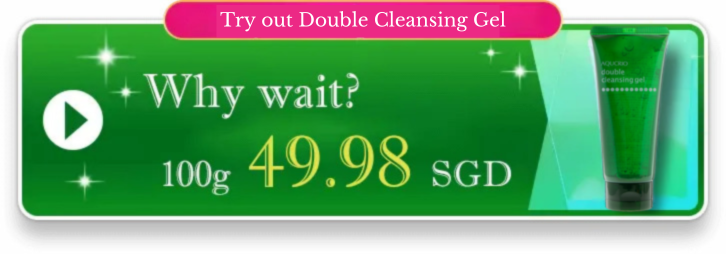
Highly moisturizing skincare that strengthens the skin barrier
To improve your skin’s sebum production, it is equally important to moisturize your skin.
To recap, it is important to properly moisturize by:
- Hydrating the skin by replenishing water
- Preventing hydration from evaporating out of the skin by replenishing oil
Aquatect Gel
We’d like to introduce Aquatect Gel, an all-in-one gel moisturizer.
Aquatect Gel is perfect for people struggling with acne because:
- It contains 16 moisturizing ingredients that make it highly moisturizing.
- It has passed 3 skincare safety tests and is low-stimulus.
- It is an all-in-one product that completes your skincare with just one bottle.
Moisturizers that are best for acne-prone skin are ones that are highly moisturizing and are low-stimulus.
Aquatect Gel has passed these requirements!
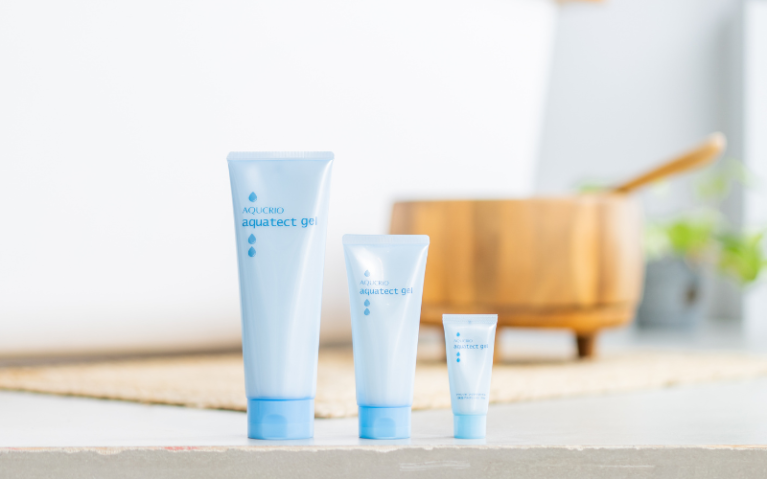
Formulated with 16 moisturizing ingredients, Aquatect Gel replenishes plently of water and oil to the skin at the same time and is highly effective in moisturizing the skin.
It keeps the skin moisturized for a long time and prevents sebum production.
It has also passed 3 skincare safety tests.
- Patch test
- Allergy test
- Stinging test
If you are serious about solving your acne, please try revising your skincare by moisturizing with Aquatect Gel!

Gentle sunscreens
To recap, it is best to choose a sunscreen that meets the following 5 points.
- SPF 20~30
- Non-comedogenic tested
- Contains 100% UV scattering agents
- Waterproof
- Cream-type or milk-type
If you choose your sunscreen based on the 5 criteria, you can prevent your acne from worsening, but also prevent sunburns, wrinkles, and skin aging.
Skincare tips to prevent and solve teenage acne
Our teenage years is when we start to care more about our appearance and how other people see us.
While it is understandable that people self-teach themselves a skincare routine to solve their acne, incorrect skincare can worsen acne and even leave scars,
This is why a correct skincare routine is crucial.
Below are 4 key points of correct skincare that will prevent and solve teenage acne.
Wash your face a maximum of twice a day
When you have acne, it is understandable that you may want towash your face multiple times a day to get rid of the sebum and oil.
If you become overly sensitive and wash your face frequently, you end up washing your skin’s natural and essential oil content.
This will dry out your skin.
To maintain a good balance of water and oil in your skin, only wash your face 2 times per day.
Moreover, even if you wash your face twice a day, it can lead to skin troubles if you wash your face incorrectly.
Do not scrub your face without lathering the cleanser, and do not rinse with hot water.
To minimize irritation, wash gently and rinse thoroughly with lukewarm water.
Do not use scrubs and exfoliators everyday
Scrubs and exfoliators are cleansers that contain fine particles such as seeds and resins.
They have a rough texture, and remove more dirt and dead skin cells from pores than regular cleansers.
They also help skincare products absorb into the skin, so they are said to be helpful for acne and acne-prone skin.
However, scrubs and exfoliators are more irritating to the skin than regular cleansers.
Therefore, daily use can worsen acne.
If you use scrubs and exfoliators, only use them every once or twice a week, and use a regular cleanser for the rest of the week.
It is especially best to refrain from using scrubs and exfoliators when pimples are red or inflamed, and when your skin is sunburnt.
Moisturize frequently
One of the main causes of teenage acne is excessive sebum production caused by a hormonal imbalance.
However, the skin’s barrier function is weakened in areas where there is acne.
If those areas are not properly moisturized, the skin will become dry and vulnerable to external irritants, which can prolong acne and cause other skin problems.
Therefore, it is crucial to moisturize properly and frequently throughout the day.
Do not forget UV protection
To prevent teenage acne, UV protection is also very important.
Acne skin has a weakened skin barrier, so it is more prone to UV damage.
If UV protection measures are not taken, it will cause long-term skin troubles.
Therefore, it is important to protect your skin from UV rays after face washing and moisturizing.
Sunscreen should be applied every day.
Be sure to use a non-chemical, non-comedogenic sunscreen that is SPF 20~30.
Reapply when necessary too, when you sweat.
Moreover, sunscreen cannot completely block UV rays, so other measures such as hats and sun umbrellas are also effective.
Lifestyle tips to prevent and solve teenage acne
Apart from skincare, teenage acne can also be prevented by changing your lifestyle habits.
Below are 3 lifestyle tips that will prevent and solve teenage acne.
Do not touch or pop pimples
When pimples appear, it can be very tempting to pop them.
But you should never pop or break them.
Some people mistakenly believe that if they pop a pimple while it is small, they can prevent it from spreading futher and can heal it quicker.
If you pop a pimple, bacteria can go inside, causing inflammation and damaging the surrounding skin.
Strongly inflamed acne can leave scars even after they have healed, and the bumps will remain even after adulthood.
Therefore, do not pop pimples.
Do not touch them as much as possible, as touching it can also transfer bacteria to these areas.
Get enough sleep
Sleep is a big factor for teenage acne.
Specifically, 7~8 hours of good quality sleep is recommended.
Sleep is not only important for resting the body, but is also important to release growth hormones that help muscles recover and build skin cells.
A lack of sleep prevents the growth of new skin cells and weakens the skin barrier.
If it is difficult to sleep early, at least try to sleep and wake up around the same time everyday.
This will help establish a routine.
To get good quality sleep, avoid caffeine or looking at a screen for a long time before you sleep.
Maintain a nutritious and balanced diet
An unbalanced diet, such as eating a lot of fried and oily foods, can lead to excessive sebum production.
To prevent your acne from worsening, it is very important to eat a balanced diet and build a healthy body.
Especially because puberty is an important time for physical growth, it is important not to restrict certain foods or eat an abundance of certain foods.
A well-balanced diet is one that includes a staple carbohydrate (rice, bread, noodles), a main dish (meat, fish, eggs, soybeads), and a side dish (vegetables, mushrooms).
Having all 3 can help maintain a balance beween carbohydrates, protein, vitamins, and minerals naturally.
You should also consciously consume green and yellow vegetables, foods rich in dietary fiber, and vitamins B2, B6, and C.
Be mindful of how often you eat instand foods and fast foods, as they tend to upset the nutritional balance.
FAQ
Q: When will teenage acne disappear?
A: Typically, teenage acne disappears around the age of 20. This is because your hormonal balance stabilizes and your sebum production decreases.
However, there are some cases were acne continues after 20 years of age or leads to scars and inflammation.
The symptoms and timing of teenage acne vary from person to person, depending on your hormonal balance, sebum production, skincare, and lifestyle habits.
If you are looking for early and quick improvements, it is important to understand these individual differences, skincare, and lifestyle habits that suit you best.
Q: Does teenage acne disappear naturally?
A: For most people, teenage acne disappears naturally by conducting proper skincare and changing lifestyle habits.
Teenage acne is a unique condition that occurs when sebum production is excessive during puberty.
Once sebum production becomes more regulated, acne will gradually disappear.
However, some lifestyle habits and stress can cause negative consequences on acne, so it can be difficult to solve naturally.
We recommend revising your skincare and lifestyle practices, or consulting a dermatologist if symptoms becomes severe.
Summary
Teenage acne is a type of acne that occurs from upper elementary school through high school.
Its main cause is excessive sebum production caused by a hormonal imbalance during puberty.
The following tips are important for preventing and improving teenage acne.
- Wash your face a maximum of 2 times a day.
- Properly moisturize after washing your face.
- Take UV protection measures.
- Consult a dermatologist if necessary.
- Be aware of your diet and sleep schedule.
Teenage acne can be worsened by incorrect skincare.
To avoid this from happening, we hope you use the information in this article to help you take care of your skin.

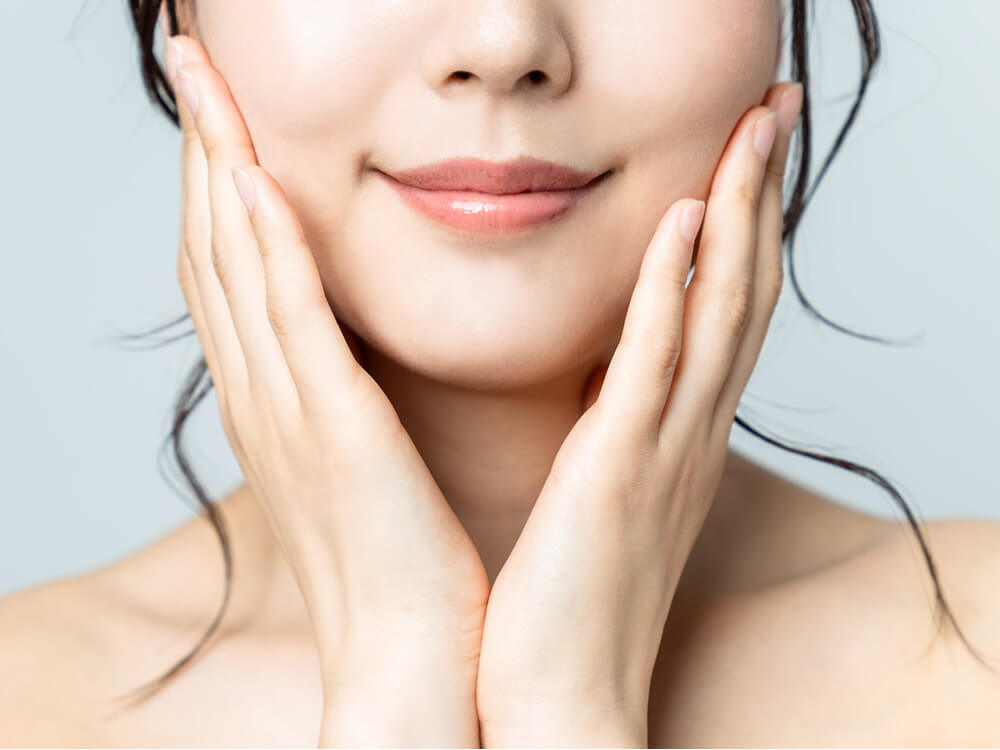


コメント